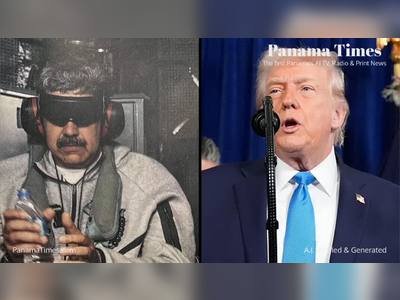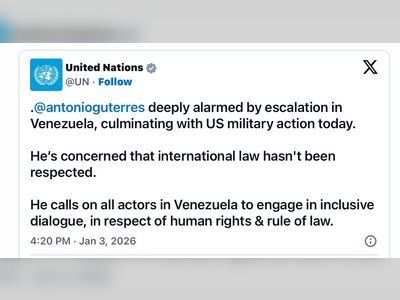Democrats Call on Biden to Protect Controversial Temporary Protected Status Program
With a new administration set to take office, Democrats urge action to preserve a program shielding migrants from deportation.
As the transition to a new U.S. administration approaches, the Temporary Protected Status (TPS) program has become a focal point of intense political debate.
Democrats, led by Senator Dick Durbin of Illinois, are urging President Joe Biden to act swiftly to safeguard the program before President-elect Donald Trump assumes office.
Trump has pledged to significantly restrict or end TPS, reigniting controversies surrounding the program’s purpose and implementation.
Temporary Protected Status, established in the 1990s, grants migrants from designated countries work permits and protection from deportation if their home nations are deemed unsafe due to conflict, natural disasters, or other extraordinary circumstances.
The Biden administration expanded TPS designations to include nations such as Venezuela, Haiti, and Afghanistan, allowing hundreds of thousands of migrants to remain legally in the United States.
Currently, nationals from seventeen countries benefit from TPS protections.
The program has faced challenges before.
During Trump’s first term, attempts were made to scale back TPS for multiple countries.
Legal battles ensued, with civil rights groups opposing the administration's efforts, delaying changes for years.
Now, Trump’s 2024 campaign has amplified calls for stricter immigration policies, with TPS once again at the forefront.
The situation has been further fueled by reports of Haitian migrants arriving en masse, partly enabled by the CBP One app and a program allowing thirty thousand migrants per month from four countries to enter the U.S. legally.
These migrants could potentially qualify for TPS if they arrived before their country’s re-designation.
Towns like Springfield, Ohio, have reported being overwhelmed by the influx, prompting Trump and his running mate, Senator J.D. Vance, to advocate for revoking Haiti’s TPS designation.
'It’s been overrun.
You can’t do that to people.
I’d revoke TPS, and I’d bring [the migrants] back to their country,' Trump said in an interview with NewsNation.
Vance echoed his running mate, describing TPS as a 'government edict' that prevents deportations and criticizing its repeated extensions.
Critics argue that the program has strayed from its intended temporary nature, becoming a de facto long-term solution for migrants.
Republicans in Congress have also moved to restrict TPS.
Senator-elect Jim Banks of Indiana has introduced a bill requiring Congressional approval for new TPS designations, with twelve-month terms and additional Congressional actions required for extensions.
Trump’s broader immigration plans are expected to include mass deportations and further restrictions on programs like TPS.
In response, Democrats have called on Biden to extend TPS protections for as many countries as possible before his term ends.
'The window to secure and finalize your administration’s policies is closing rapidly,' reads a letter from Durbin and other Senate Democrats to Biden.
The letter emphasizes the need to 'protect immigrant families' and preserve the progress made under the Biden administration.
Despite these appeals, the Biden administration has not announced new TPS designations or extensions, leaving the program’s future uncertain as the January inauguration nears.
The debate over TPS underscores the broader tensions in U.S. immigration policy, reflecting deep divisions on how to balance humanitarian considerations with border security and national interests.
With time running out, the fate of TPS hangs in the balance, poised to become a defining issue in the transition to the next administration.
Democrats, led by Senator Dick Durbin of Illinois, are urging President Joe Biden to act swiftly to safeguard the program before President-elect Donald Trump assumes office.
Trump has pledged to significantly restrict or end TPS, reigniting controversies surrounding the program’s purpose and implementation.
Temporary Protected Status, established in the 1990s, grants migrants from designated countries work permits and protection from deportation if their home nations are deemed unsafe due to conflict, natural disasters, or other extraordinary circumstances.
The Biden administration expanded TPS designations to include nations such as Venezuela, Haiti, and Afghanistan, allowing hundreds of thousands of migrants to remain legally in the United States.
Currently, nationals from seventeen countries benefit from TPS protections.
The program has faced challenges before.
During Trump’s first term, attempts were made to scale back TPS for multiple countries.
Legal battles ensued, with civil rights groups opposing the administration's efforts, delaying changes for years.
Now, Trump’s 2024 campaign has amplified calls for stricter immigration policies, with TPS once again at the forefront.
The situation has been further fueled by reports of Haitian migrants arriving en masse, partly enabled by the CBP One app and a program allowing thirty thousand migrants per month from four countries to enter the U.S. legally.
These migrants could potentially qualify for TPS if they arrived before their country’s re-designation.
Towns like Springfield, Ohio, have reported being overwhelmed by the influx, prompting Trump and his running mate, Senator J.D. Vance, to advocate for revoking Haiti’s TPS designation.
'It’s been overrun.
You can’t do that to people.
I’d revoke TPS, and I’d bring [the migrants] back to their country,' Trump said in an interview with NewsNation.
Vance echoed his running mate, describing TPS as a 'government edict' that prevents deportations and criticizing its repeated extensions.
Critics argue that the program has strayed from its intended temporary nature, becoming a de facto long-term solution for migrants.
Republicans in Congress have also moved to restrict TPS.
Senator-elect Jim Banks of Indiana has introduced a bill requiring Congressional approval for new TPS designations, with twelve-month terms and additional Congressional actions required for extensions.
Trump’s broader immigration plans are expected to include mass deportations and further restrictions on programs like TPS.
In response, Democrats have called on Biden to extend TPS protections for as many countries as possible before his term ends.
'The window to secure and finalize your administration’s policies is closing rapidly,' reads a letter from Durbin and other Senate Democrats to Biden.
The letter emphasizes the need to 'protect immigrant families' and preserve the progress made under the Biden administration.
Despite these appeals, the Biden administration has not announced new TPS designations or extensions, leaving the program’s future uncertain as the January inauguration nears.
The debate over TPS underscores the broader tensions in U.S. immigration policy, reflecting deep divisions on how to balance humanitarian considerations with border security and national interests.
With time running out, the fate of TPS hangs in the balance, poised to become a defining issue in the transition to the next administration.











